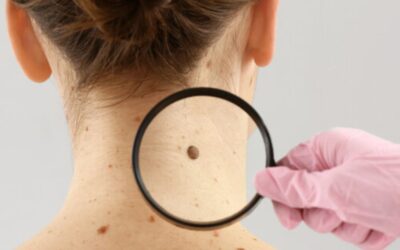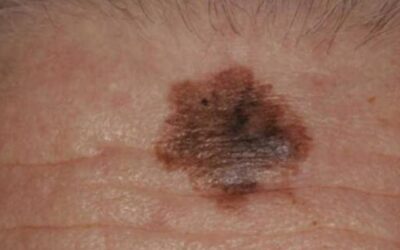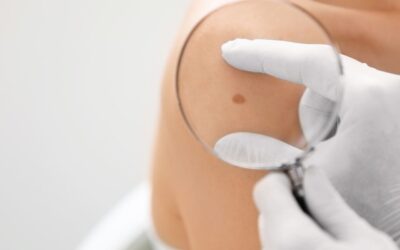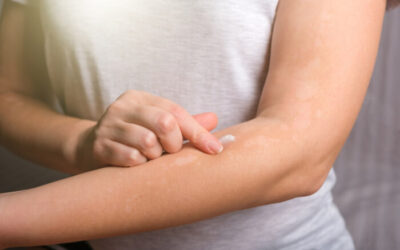Lichen Simplex Chronicus (LSC) is a common type of long-term neurodermatitis that causes dry, scaly, and thick patches of skin.
The cause of the disorder could be a primary symptom, a sign of a psychological problem, or a side effect of another skin problem like eczema or psoriasis.
What Is Lichen Simplex Chronicus
Lichen Simplex Chronicus (LSC) is a skin condition that causes the skin to get thicker and scaly from repeated scratching or rubbing.
Lichen simplex chronicus is not the first process. Instead, lichenification happens when a person feels itchiness in a certain area of skin, with or without underlying disease, and then induces physical trauma to the point where lichenification happens.
The itch-scratch cycle happens as the itch continues and scratching turns automatic and repeated.
Lichen simplex frequently develops on exposed skin, including the genitalia, head, neck, arms, and hands.
Who Gets Lichen Simplex Chronicus?
Up to 12% of the population has been reported to have Lichen Simplex Chronicus. Women between the ages of 30 and 50 are most commonly diagnosed with the condition.
Lichen Simplex Chronicus is not contagious and is not brought on by a pathogen like fungi, bacteria, or parasites.
What are the Symptoms of Lichen Simplex Chronicus?
In places that are easily accessible such as the hands, arms, head, neck, and genitals, Lichen Simplex Chronicus manifests as scaly, dry patches of skin.
These patches vary in size according to how much skin is damaged by the frequent scratching, and they can eventually take on a yellow or brown hue that doesn’t match the rest of the person’s skin tone.
To defend itself against the constant rubbing and scratching, the body creates tougher skin.
With that, the skin that has been lichenified is:
- leathery,
- thick,
- has prominent skin creases
What Causes Lichen Simplex Chronicus?

Current findings suggest that both emotional and environmental variables contribute to Lichen Simplex Chronicus.
Itching is a physical manifestation of the psychological anguish associated with:
- Anxiety Disorders
- Depressive Disorders
- Obsessive-Compulsive Disorder
According to studies, scratching can be used as a mental diversion. This confluence of psychological, emotional, and physical elements may cause someone to experience the itch-scratch cycle repeatedly.
In terms of environmental causes, the following can all contribute to itchy skin:
- hot weather
- perspiration
- dry air
- detergents
- scented items may irritate the skin
How is Lichen Simplex Chronicus Diagnosed?
As part of the diagnosis of Lichen Simplex Chronicus, the patient’s medical and family histories may be asked.
Once the problematic area has been thoroughly examined during a physical examination, the doctor may advise further testing to rule out other skin disorders.
The doctor may conduct the following:
- Patch Test. By examining skin reactions following contact with suspected allergens, a patch test can be used to rule out an allergic reaction.
- Skin Biopsy. In some circumstances, a skin biopsy can be performed to rule out the existence of other skin conditions.
- Blood Cultures. Blood cultures can also aid in excluding the presence of potential pathogens, such as yeast infections.
How To Treat Lichen Simplex Chronicus
Lichen Simplex Chronicus can be treated in a number of different ways.
- Anti-inflammatory Drugs. Itching and inflammation can be controlled with anti-inflammatory drugs such as topical steroids. It may also be advised to apply topical salicylic acid, which can aid with the thickened skin.
- Antibiotic Treatment. If the area is contaminated, a medical expert could suggest antibiotic treatment.
- Antihistamine Medications. Antihistamine medications may help control the reaction if the inflammation appears to be an allergic reaction to an environmental allergen. In this case, a medical practitioner might suggest that the patient limit their exposure to the allergen.
- Mental Health Practitioner. Given the connections between Lichen Simplex Chronicus and mental health issues, a person may think about speaking with a mental health practitioner to address the emotional stress that could cause persistent itching.
Key Takeaways
You should see a doctor if your Lichen Simplex Chronicis symptoms worsen or if you experience any new symptoms, particularly if you exhibit any symptoms of skin infection including pain, redness, discharge from the region, or fever.
The goal of Skin Cancer Specialists is to provide you with the greatest possible cosmetic outcome while keeping your treatment affordable.
The knowledgeable staff at Skin Cancer Specialists in Sugarland, Houston, Katy, and Conroe, Texas, is aware of how important your skin’s health is to both your general well-being and sense of self.












